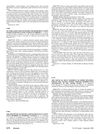2 citations,
March 2021 in “Reproduction” Finasteride may affect male fertility by interfering with specific sperm signaling.
 2 citations,
September 2017 in “Archives of Medical Science”
2 citations,
September 2017 in “Archives of Medical Science” Finasteride affects offspring's antioxidant enzymes in epididymis, possibly disrupting sperm maturation.
 2 citations,
January 2015 in “Springer eBooks”
2 citations,
January 2015 in “Springer eBooks” Environmental factors and exposure to toxins may contribute to male infertility by affecting sperm and hormone function.
 1 citations,
May 2011 in “Journal of Human Reproductive Sciences”
1 citations,
May 2011 in “Journal of Human Reproductive Sciences” Finasteride may decrease semen quality but not harm sperm production, and stopping the drug can improve semen quality; hyperprolactinemia can cause infertility but is treatable with medication.
 June 2021 in “Archives of Advances in Biosciences”
June 2021 in “Archives of Advances in Biosciences” Finasteride reduces sperm count and quality and alters hormone levels in mice.
January 2019 in “Indian Journal of Dermatology, Venereology and Leprology”  14 citations,
June 2022 in “BMC genomics”
14 citations,
June 2022 in “BMC genomics” Key genes crucial for sheep hair follicle development were identified, aiding fine wool breeding and human hair loss research.
 4 citations,
April 2021 in “Frontiers in Immunology”
4 citations,
April 2021 in “Frontiers in Immunology” Different types of RNAs are found in varying amounts in patients with Polycystic Ovary Syndrome, suggesting they could be important in the disease's development and potentially used as disease markers.
 106 citations,
November 2014 in “Cell Stem Cell”
106 citations,
November 2014 in “Cell Stem Cell” New single-cell analysis techniques are improving our understanding of stem cells and could help in treating diseases.
 104 citations,
October 1999 in “The Journal of Urology”
104 citations,
October 1999 in “The Journal of Urology” Finasteride doesn't harm male fertility or sperm quality, but may slightly reduce ejaculate volume.
 5 citations,
June 2008 in “Acta Cirurgica Brasileira”
5 citations,
June 2008 in “Acta Cirurgica Brasileira” Finasteride causes sperm production decrease in Mesocricetus auratus.
2 citations,
December 2020 in “Frontiers in genetics” Researchers found genes linked to feather growth speed in Shouguang chickens, highlighting two genes that might explain differences in feathering.
 18 citations,
June 2002 in “BJUI”
18 citations,
June 2002 in “BJUI” Finasteride doesn't change rat testicle weight or sperm production.
 17 citations,
January 2013 in “Our Dermatology Online”
17 citations,
January 2013 in “Our Dermatology Online” Dutasteride mesotherapy helps treat male hair loss but may harm sperm and sexual function.
 September 2008 in “Fertility and Sterility”
September 2008 in “Fertility and Sterility” Men and women in infertile couples feel using donor sperm may cause more stress and marital issues than using donor eggs.
 14 citations,
May 2021 in “Marine Drugs”
14 citations,
May 2021 in “Marine Drugs” PDRN, derived from salmon sperm, shows promise in healing wounds, reducing inflammation, and regenerating tissues, but more research is needed to understand its mechanisms and improve its use.
 20 citations,
November 2019 in “International Journal of Environmental Research and Public Health”
20 citations,
November 2019 in “International Journal of Environmental Research and Public Health” Breathing in high levels of certain air pollutants significantly increases women's risk of developing Polycystic Ovary Syndrome.
 10 citations,
October 2008 in “Andrologia”
10 citations,
October 2008 in “Andrologia” Finasteride changes antioxidant enzyme expression, possibly affecting sperm protection in rats.
 3 citations,
February 2018 in “Human Reproduction”
3 citations,
February 2018 in “Human Reproduction” A man with testotoxicosis was fertile despite low FSH levels, suggesting high testosterone may allow sperm production without FSH.
May 2004 in “Biochimica et Biophysica Acta (BBA) - Molecular Basis of Disease” Vitamin E affects liver metabolism, enhancing stress resistance, reducing blood clotting, and altering hormone processing.
 March 2014 in “Fertility and Sterility”
March 2014 in “Fertility and Sterility” The April 2014 issue of "Fertility and Sterility" discussed various reproductive health topics, including hormone therapy benefits, sperm and genetic factors in male infertility, and the link between PCOS and diabetes.
 33 citations,
April 2015 in “Current Opinion in Endocrinology, Diabetes and Obesity”
33 citations,
April 2015 in “Current Opinion in Endocrinology, Diabetes and Obesity” 5α reductase inhibitors treat hair loss but may cause sexual side effects and risks.
 18 citations,
June 2009 in “Journal of Molecular Endocrinology”
18 citations,
June 2009 in “Journal of Molecular Endocrinology” Finasteride exposure harms tadpole reproduction and hormone balance.
 72 citations,
October 1998 in “Baillière's clinical endocrinology and metabolism”
72 citations,
October 1998 in “Baillière's clinical endocrinology and metabolism” Long-term testosterone therapy can cause hormone suppression, affect prostate and heart health, and alter physical characteristics, but does not increase prostate cancer risk and needs more research for full risk assessment.
 68 citations,
February 2019 in “Urology”
68 citations,
February 2019 in “Urology” Hormonal treatment in transgender women reduces semen quality, but stopping treatment may improve it.
 39 citations,
January 2019 in “The World Journal of Men's Health”
39 citations,
January 2019 in “The World Journal of Men's Health” Testosterone replacement therapy can prevent men from fathering children and should not be used by those wanting to stay fertile.
 38 citations,
December 2010 in “Fertility and Sterility”
38 citations,
December 2010 in “Fertility and Sterility” Finasteride may cause male infertility, stopping it can help.
 35 citations,
June 2005 in “The Milbank Quarterly”
35 citations,
June 2005 in “The Milbank Quarterly” The conclusion is that formalizing how past decisions influence current health technology assessments could improve the credibility and defense of coverage decisions.
 13 citations,
January 2019 in “Endocrine journal”
13 citations,
January 2019 in “Endocrine journal” Dihydrotestosterone treatment can help penis growth in boys with 5α-reductase deficiency but doesn't fully normalize size after puberty.
 1 citations,
July 2023 in “F&S Reviews”
1 citations,
July 2023 in “F&S Reviews” Some common medications may harm male fertility by affecting hormones, sperm production, and sexual function.

























